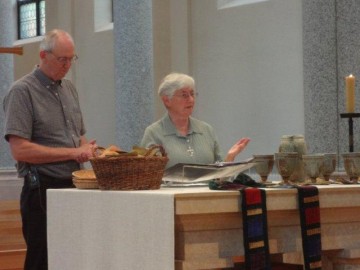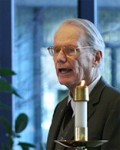
Saint Joseph, MN (BRIDGEFOLK) — Forty Mennonites and Catholics gathered July 26-29 at Saint Benedict’s monastery in St. Joseph,MN for the eleventh annual Bridgefolk conference.
Bridgefolk is a movement of sacramentally-minded Mennonites and peace-minded Roman Catholics who come together to celebrate each other’s traditions, explore each other’s practices, and honor each other’s contribution to the mission of Christ’s Church.
This year’s conference was the third in series on shared practices central to the Christian life and was organized around the theme, “Formed in the Word: Scripture and Peacemaking.” Keynote speakers were Michael Patella (Saint John’sAbbey) and Helmut Harder (Mennonite Church Canada), who gave presentations on Catholic and Mennonite ways of interpreting and applying Scripture.
In addition to historical traditions, the conference focused on spiritual practices of reading Scripture. Continue reading “Reading Scripture, Breaking Bread: Bridgefolk 2012”

 A keynote address by Br. Jeffrey Gros, FSC, to the 2011 National Workshop on Christian Unity last May has recently come to our attention. In it he called attention to the use of footwashing at a historic service of repentance and reconciliation, in which representatives of the Lutheran World Federation confessed 16th-century persecution of Anabaptists as a sin. This “icon” should serve as a model for planning similar commemorations as Christians around the world mark the 500-year anniversary of the Protestant Reformation in 2017, he said.
A keynote address by Br. Jeffrey Gros, FSC, to the 2011 National Workshop on Christian Unity last May has recently come to our attention. In it he called attention to the use of footwashing at a historic service of repentance and reconciliation, in which representatives of the Lutheran World Federation confessed 16th-century persecution of Anabaptists as a sin. This “icon” should serve as a model for planning similar commemorations as Christians around the world mark the 500-year anniversary of the Protestant Reformation in 2017, he said.